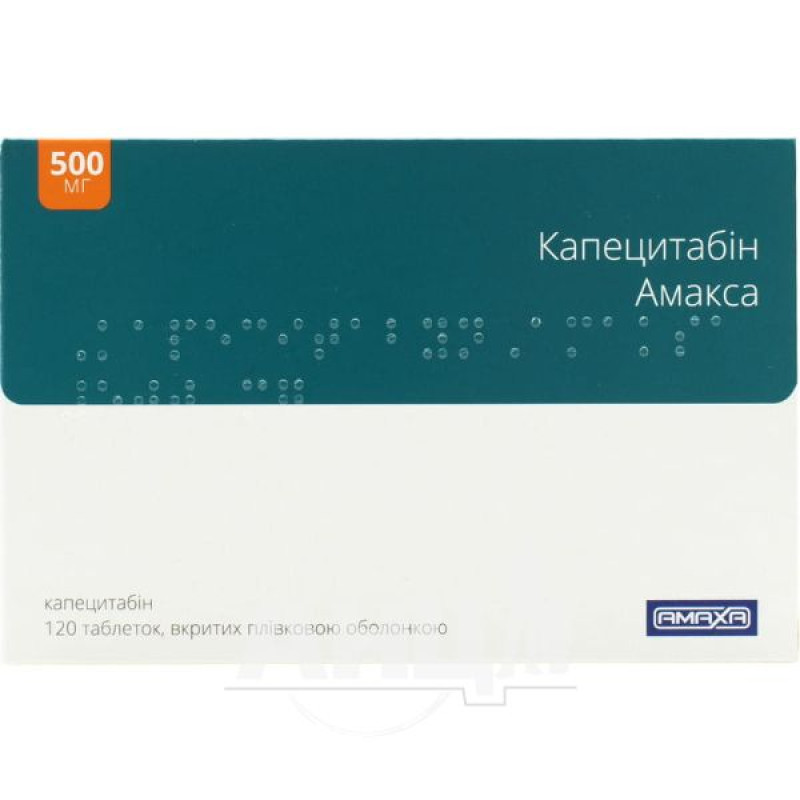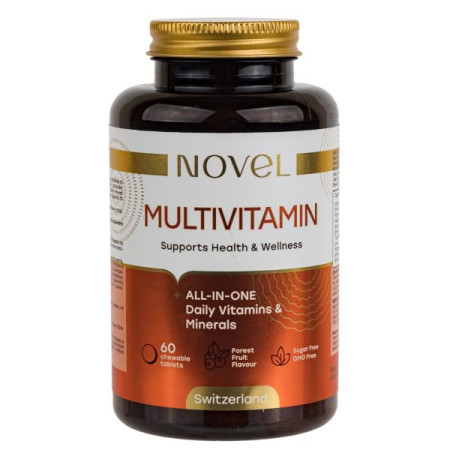Capecitabine Amaxa film-coated tablets 500 mg blister No. 120

Capecitabine AMAX tablets are indicated for the treatment of:
Breast cancer:
locally advanced or metastatic breast cancer, in combination with docetaxel after failure of chemotherapy including anthracyclines; locally advanced or metastatic breast cancer, in the absence of chemotherapy including taxanes and anthracyclines, or in the presence of contraindications to anthracycline therapy.Colon cancer, colorectal cancer:
Colon cancer, in adjuvant therapy, a first-line drug for the treatment of colorectal cancer with metastases.Esophageal and gastric cancer. First-line drug for the treatment of advanced esophageal and gastric cancer.
Composition
Active ingredient: capecitabine;
1 tablet contains 150 mg or 500 mg of capecitabine;
Excipients: lactose, croscarmellose sodium, hypromellose, microcrystalline cellulose, magnesium stearate
Film shell:
for 150 mg tablets - Opadry II pink 85F240015: polyvinyl alcohol (E 1203), titanium dioxide (E 171), macrogol (E 1521), talc (E 553b), red iron oxide (E 172), yellow iron oxide (E 172); for 500 mg tablets - Opadry II pink 85F240045: polyvinyl alcohol (E 1203), titanium dioxide (E 171), macrogol (E 1521), talc (E 553b), red iron oxide (E 172), yellow iron oxide (E 172), black iron oxide (E 172).Contraindication
Severe, including unexpected, reactions to treatment with fluoropyrimidines. Hypersensitivity to capecitabine or to any component of the drug, or to fluorouracil. Known deficiency of dihydropyrimidine dehydrogenase. Severe leukopenia, neutropenia, thrombocytopenia. Severe liver dysfunction. Severe renal failure (creatinine clearance <30 ml/min). Concomitant use of Sorivudine or its structural analogues such as brivudine.
Method of application
The drug should only be prescribed by a qualified physician experienced in the use of antineoplastic drugs. Careful monitoring is recommended for all patients during the first cycle of treatment.
The drug is taken orally, no later than 30 minutes after a meal, with water.
Monotherapy. Colon cancer, colorectal cancer and breast cancer the recommended daily dose of capecitabine is 2500 mg/m2 and is administered as 3-week cycles; take daily for 2 weeks followed by a 1-week rest period. The total daily dose of capecitabine is divided into two doses (1250 mg/m2 in the morning and evening).
Application features
Pregnant women
Not prescribed.
Children
Not prescribed.
Drivers
Not prescribed.
Overdose
Symptoms of acute overdose: nausea, vomiting, diarrhea, mucositis, gastrointestinal irritation and bleeding, as well as bone marrow depression. Treatment is symptomatic.
Side effects
The most frequent and/or clinically significant treatment-related adverse reactions were gastrointestinal reactions (diarrhea, nausea, vomiting, abdominal pain, stomatitis), palmar-plantar erythrodysesthesia syndrome (palmar-plantar erythrodysesthesia), weakness, asthenia, anorexia, cardiotoxicity, progression of renal dysfunction in patients with renal failure, thrombosis/embolism.
Interaction
Coumarin anticoagulants. Capecitabine enhances the effects of indirect anticoagulants (warfarin and phenprocoumon), which can lead to impaired coagulation parameters and bleeding several days or months after the start of capecitabine therapy, and in some cases - within one month after the end of treatment. In patients who simultaneously take capecitabine and oral anticoagulants - coumarin derivatives, it is necessary to conduct detailed monitoring of blood coagulation parameters (INR or prothrombin time) and select the dose of the anticoagulant.
Storage conditions
Store at a temperature not exceeding 30 °C out of the reach of children.
Shelf life - 30 months.
There are no reviews for this product.
There are no reviews for this product, be the first to leave your review.
No questions about this product, be the first and ask your question.





